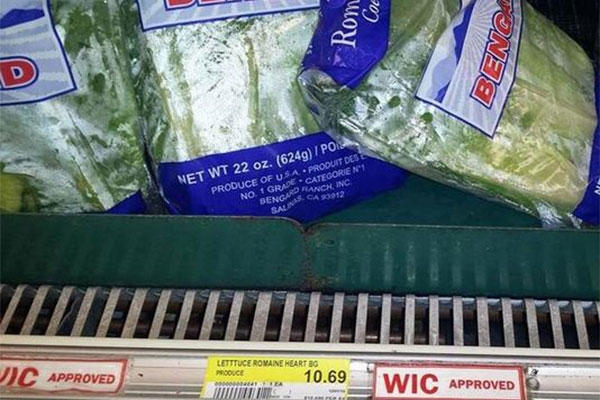While produce prices at commissaries in Guam have largely leveled-off after a price hike late last year, the price of bagged salad has skyrocketed, commissary officials said.
"The most extreme challenges are with bagged salads," Kevin Robinson, a commissary spokesman said in a statement. "On average, prices of bagged salad products have risen slightly over 200 percent. These price increases are unacceptable."
Produce prices at the two commissaries in Guam surged late last year after the start of a new supply contract that passed on shipping costs to shoppers. Under previous agreements, the Defense Department had paid the roughly $48 million shipping expense, which also includes US military bases in Korea and Japan.
The price increase is evident in greens. In early December, for example, some pre-washed, bagged romaine lettuce was priced at $10.69. Bagged, baby spinach was $5.79, up from $1.80. Light caesar salad is $5.99, up from $1.65.
However, a list of 20 other produce items provided to Military.com by the Defense Commissary Agency shows that many have decreased in price since the new contract took effect. For instance, as of Jan. 4, a three-pound bag of granny smith apples was $3.69, down from $5.47. On the other hand, a three-pound bag of yellow onions increased from $1.98 to $2.49.
Robinson said commissary officials are working with the Guam area contractor, International Distributors, to develop different sourcing options that will reduce the price of bagged salads, which he said are considered a "convenience item."
"Our produce category manager and contracting departments are in contact with the contractors almost daily, working to identify sources of supply that can uphold the terms and conditions of the contract, with an emphasis to decrease pricing without sacrificing quality and freshness," he said.
The December price hike was the result of "supply challenges" associated with the contract transition, he said. Currently about 40 percent of available produce is airlifted, 57 percent is brought in by boat and three percent is sourced locally, Robinson said.
DeCA said they expect prices to go down over time as more and more produce is sourced locally. However, they said, that shift will require American shoppers to be accepting of unfamiliar produce, such a different varieties of eggplant.
Meanwhile, one congressman who last year opposed the contract change has sent a letter to the Defense Department asking for details about the new contract's implementation.
"I am deeply trouble to hear that the prices of many produce items in the commissary have skyrocketed because of a new contract," wrote Rep. Duncan Hunter, R-California, in a January 4 letter to Brad Carson, who heads the DoD's personnel and readiness office. "I am further concerned that DeCA's response to price increases will be to decrease product quality, especially given that DeCA told members of Congress repeatedly that quality would increase under the new policy."
--Amy Bushatz can be reached at amy.bushatz@military.com. Follow her on Twitter at @amybushatz.




























